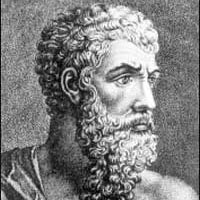Lysistrata by Aristophanes: Introduction
Lysistrata is a vulgar anti-war Greek satiric comedy by the ancient comic playwright Aristophanes. It was first staged in 411 BC, which is one of his shorter plays. This play is the comic and full of sexual account of one woman's bizarre mission to bring peace and end the Peloponnesian War between Athens and Sparta.

Aristophanes (448BC-388BC)
Lysistrata, the major female protagonist, brings the plan among the Greek women to hold a sex strike as a means of forcing the men to negotiate peace. Some critics consider it his greatest work.
The play Lysistrata is praised for the role given to the female character as a chief protagonist when there was no evidence of women attending Athenian Theatre. The role of the female was played by the male characters in the play in those days. Aristophanes’ another play where the female was presented with the main role was Thesmophoriazousai. In those days women were restricted and repressed in many ways. They were treated not better than the animals. Their vitality and importance were not considered significant. Aristophanes exposes this oppression and depicts how women are capable of handling the state affairs too except household chores.
The leading character Lysistrata is much worried about the low position of women in the society which has caused their thought to be lowly and just confined within the house and husband. She wants to break the tradition and bring peace through the unity and mind of women. In this comic play, some dialogues among the Greek women is provided with the pictures of the then social classification between male and female, the duties of women within four walls of house, the responsibilities of female towards their husbands, and some speaks of their minds too. Among all the Greek women Lysistrata is shown with the high feeling of responsibility not only to her husband but also to the state to settle the war for the sake of restoration of peace. She is presented with having the capability to convince her fellow women to hold the sex strike until peace is restored.
Lysistrata is a vehement critic of the war. When this satiric play was produced the Athens was in the war with Sparta for twenty years, which had brought various devastations in all sectors. Lysistrata reminds the audiences that the war has taken away their many great heroes and the chorus states that due to the death of young and old warriors, there was no male left to take up their position. When Aristophanes uses female figure to restore peace in the Greek states, he severely satires the male for their failure to bring the peace through the war. With the failure of men in settling the peace, only women have become the hope for peace. In doing so, Aristophanes tries to depict the intellectual and practical importance of women in the male dominated the then Greek states.
